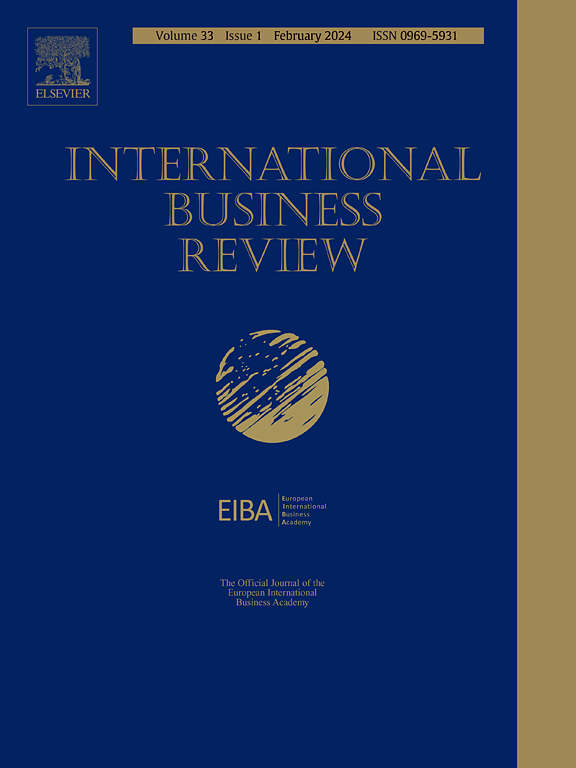政治不稳定地区全球价值链供应商的弹性:治理和信任的作用
IF 6.1
1区 管理学
Q1 BUSINESS
引用次数: 0
摘要
全球南方的供应商公司面临着来自政治不稳定的复杂风险,这挑战了他们保持参与全球价值链(GVCs)的能力。虽然弹性越来越被认为是一种关键能力,但当传统的全球价值链治理策略(通常以制度稳定性为基础)被证明不足时,供应商如何发展弹性仍不清楚。这种差距在软件开发等知识密集型服务行业尤为明显,在这些行业,规范、协调和公司间信任是核心,但往往受到政治不稳定的干扰。本研究考察了在南亚政治不稳定地区,特别是印度和巴基斯坦经营的全球价值链供应商的复原力。它侧重于治理机制的作用——例如编纂、管理复杂性和供应商能力,以及供应商弹性。它还研究了信任如何调节这些关系。利用交易成本经济学(TCE)和动态能力观(DCV),我们认为这些治理机制不仅作为效率的推动者,而且作为供应商积极动员以生存和适应的动态治理适应。采用偏最小二乘结构方程模型(PLS-SEM)对100家软件企业的调查数据进行了定量分析。研究结果表明,任务规范化和任务复杂性管理可以增强供应商的弹性。研究进一步表明,信任对任务编码和弹性之间的联系产生负向影响,挑战了信任统一加强全球价值链关系的传统假设。本研究的核心理论贡献在于扩展了TCE和DCV,展示了弹性是如何通过外部治理适应而实现的,并将信任重新思考为一种有条件的、依赖于情境的机制,而不是一种普遍利益。本文章由计算机程序翻译,如有差异,请以英文原文为准。
Resilience of GVC suppliers in politically unstable regions: The roles of governance and trust
Supplier firms in the Global South face compounded risks from political instability that challenge their ability to maintain participation in global value chains (GVCs). While resilience is increasingly acknowledged as a critical capability, it remains unclear how suppliers develop resilience when conventional GVC governance strategies, often grounded in institutional stability, prove insufficient. This gap is especially pronounced in knowledge-intensive service sectors like software development, where codification, coordination, and inter-firm trust are central but often disrupted by political instability. This study examines the resilience of GVC suppliers operating in politically unstable regions of South Asia, particularly India and Pakistan. It focuses on the role of governance mechanisms—such as codification, managing complexity, and supplier capabilities, on supplier resilience. It also investigates how trust moderates these relationships. Drawing on Transaction Cost Economics (TCE) and the Dynamic Capabilities View (DCV), we argue that these governance mechanisms function not only as efficiency enablers but also as dynamic governance adaptations that suppliers actively mobilize to survive and adapt. A quantitative analysis using partial least squares structural equation modeling (PLS-SEM) was conducted on survey data collected from 100 software firms. The results show that task codification and management of task complexity enhance supplier resilience. It further reveals that trust negatively affects the links between task codification and resilience, challenging the conventional assumption that trust uniformly strengthens GVC relationships. The core theoretical contribution of this study lies in extending TCE and DCV by showing how resilience is enabled through external governance adaptation and by rethinking trust as a conditional, context-dependent mechanism rather than a universal good.
求助全文
通过发布文献求助,成功后即可免费获取论文全文。
去求助
来源期刊

International Business Review
BUSINESS-
CiteScore
14.10
自引率
6.90%
发文量
95
审稿时长
62 days
期刊介绍:
The International Business Review (IBR) stands as a premier international journal within the realm of international business and proudly serves as the official publication of the European International Business Academy (EIBA). This esteemed journal publishes original and insightful papers addressing the theory and practice of international business, encompassing a broad spectrum of topics such as firms' internationalization strategies, cross-border management of operations, and comparative studies of business environments across different countries. In essence, IBR is dedicated to disseminating research that informs the international operations of firms, whether they are SMEs or large MNEs, and guides the actions of policymakers in both home and host countries. The journal warmly welcomes conceptual papers, empirical studies, and review articles, fostering contributions from various disciplines including strategy, finance, management, marketing, economics, HRM, and organizational studies. IBR embraces methodological diversity, with equal openness to papers utilizing quantitative, qualitative, or mixed-method approaches.
 求助内容:
求助内容: 应助结果提醒方式:
应助结果提醒方式:


